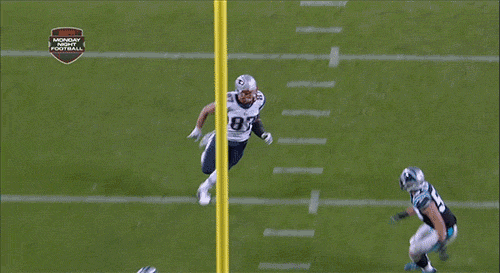Why Officials Think They Got the End of the Patriots Game Right
No one in New England is pleased at the way the Patriots game against the Panthers ended—the officials’ decision not to call pass interference against the Panthers on the last play of the game, ensuring them the win. (Side note: no one outside New England cares. Typical.)
Officials messed up by not offering a better explanation on the field for why they picked up the flag on what initially appeared to be a pass interference call. It gave us an entire night of stewing and watching GIFs of Gronkowski getting smothered by linebacker Luke Kuechly, whom you may remember from Boston College. But the refs have since explained themselves, and they think they got it right.
As Deadspin’s Barry Petchesky explains, if the call had been illegal contact or defensive holding, it would not have mattered whether Tom Brady’s pass, which was definitely short, was “catchable.” But defensive pass interference requires that the receiver be in a position where, had he not been bear hugged, he could have got to the ball. “Pass interference is the only penalty that could have been called correctly, since the ball was in the air when the contact occurred,” Petchesky explains. That narrows the debate to whether Gronk could have conceivably made that catch.
With that in mind, here’s how referee Clete Blakeman explained it to Mike Reiss of ESPN Boston and Joseph Person of the Charlotte Observer:
The back judge saw that there was contact and the defender was not playing the ball and that led him to throw for defensive pass inference, was the initial call.
There were two officials that came in. One was the umpire and the other one was our side judge and there was a discussion at that point as to the, in essence, the catchability of the ball due to its location. So it was determined at that point in time that when the primary contact occurred on the tight end that the ball, in essence, was coming in underthrown and in essence it was immediate at that point intercepted at the front end of the end zone. So there was a determination that, in essence, uncatchability, that the ball was intercepted at or about the same time the primary contact against the receiver occurred.
Plenty of people disagree, arguing that Gronkowski could have gotten there or that the context of the call—at the end of the game, on Panthers turf—affected officials’ judgement. You can sit there on loop and play Monday Morning Referee with the rest of us, but the ruling will stand.
That leaves us with the bigger-picture points, being made by a few calmer voices out there. This was just one play, the significance of which matters only because it was the final play. There are plenty of bad calls in football, and as Brady often notes, if you don’t want to get screwed on one call, put yourself in a better position to win. Also, it’s a football game. But maybe that last point is erring too far on the side of “big picture.” It’s a game, but a frustrating one.




